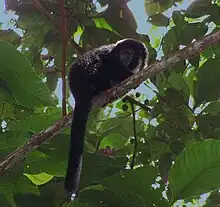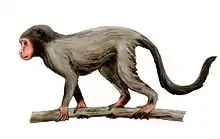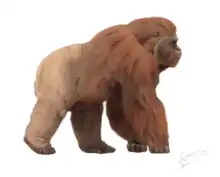| Cheracebus | |
|---|---|
 | |
| Black titi (Cheracebus lugens) | |
| Scientific classification | |
| Domain: | Eukaryota |
| Kingdom: | Animalia |
| Phylum: | Chordata |
| Class: | Mammalia |
| Order: | Primates |
| Suborder: | Haplorhini |
| Infraorder: | Simiiformes |
| Family: | Pitheciidae |
| Subfamily: | Callicebinae |
| Genus: | Cheracebus Byrne et al., 2016[1] |
| Type species | |
| Simia lugens Humboldt, 1811 | |
| Species | |
|
Cheracebus lucifer | |
Cheracebus is one of three genera of titi monkeys. Monkeys in this genus, particularly the type species Cheracebus lugens, are sometimes referred to as widow titi monkeys.[1]
Historically, titis were monogeneric, comprising only the genus Callicebus Thomas, 1903. Owing to the great diversity found across titi monkey species, a new genus-level taxonomy was recently proposed that recognises three genera within the subfamily Callicebinae; Cheracebus Byrne et al., 2016 for the species of the torquatus group (Widow titis); Plecturocebus Byrne et al., 2016 for the Amazonian and Chaco titis of the moloch and donacophilus groups; and Callicebus Thomas, 1903 sensu stricto, for species of the Atlantic Forest personatus group.[1]
Cheracebus is derived from the Latin chera (from the Greek χηρα) meaning widow and cebus (from the Greek kebos) meaning long tailed monkey.[1]
Species
There are 5 species in this genus:
- Lucifer titi monkey, Cheracebus lucifer
- Black titi monkey, Cheracebus lugens
- Colombian black-handed titi monkey, Cheracebus medemi
- Red-headed titi monkey, Cheracebus regulus
- Collared titi monkey, Cheracebus torquatus

References
- 1 2 3 4 Byrne, Hazel; Rylands, Anthony B.; Carneiro, Jeferson C.; Alfaro, Jessica W. Lynch; Bertuol, Fabricio; da Silva, Maria N. F.; Messias, Mariluce; Groves, Colin P.; Mittermeier, Russell A. (2016-01-01). "Phylogenetic relationships of the New World titi monkeys (Callicebus): first appraisal of taxonomy based on molecular evidence". Frontiers in Zoology. 13: 10. doi:10.1186/s12983-016-0142-4. ISSN 1742-9994. PMC 4774130. PMID 26937245.



